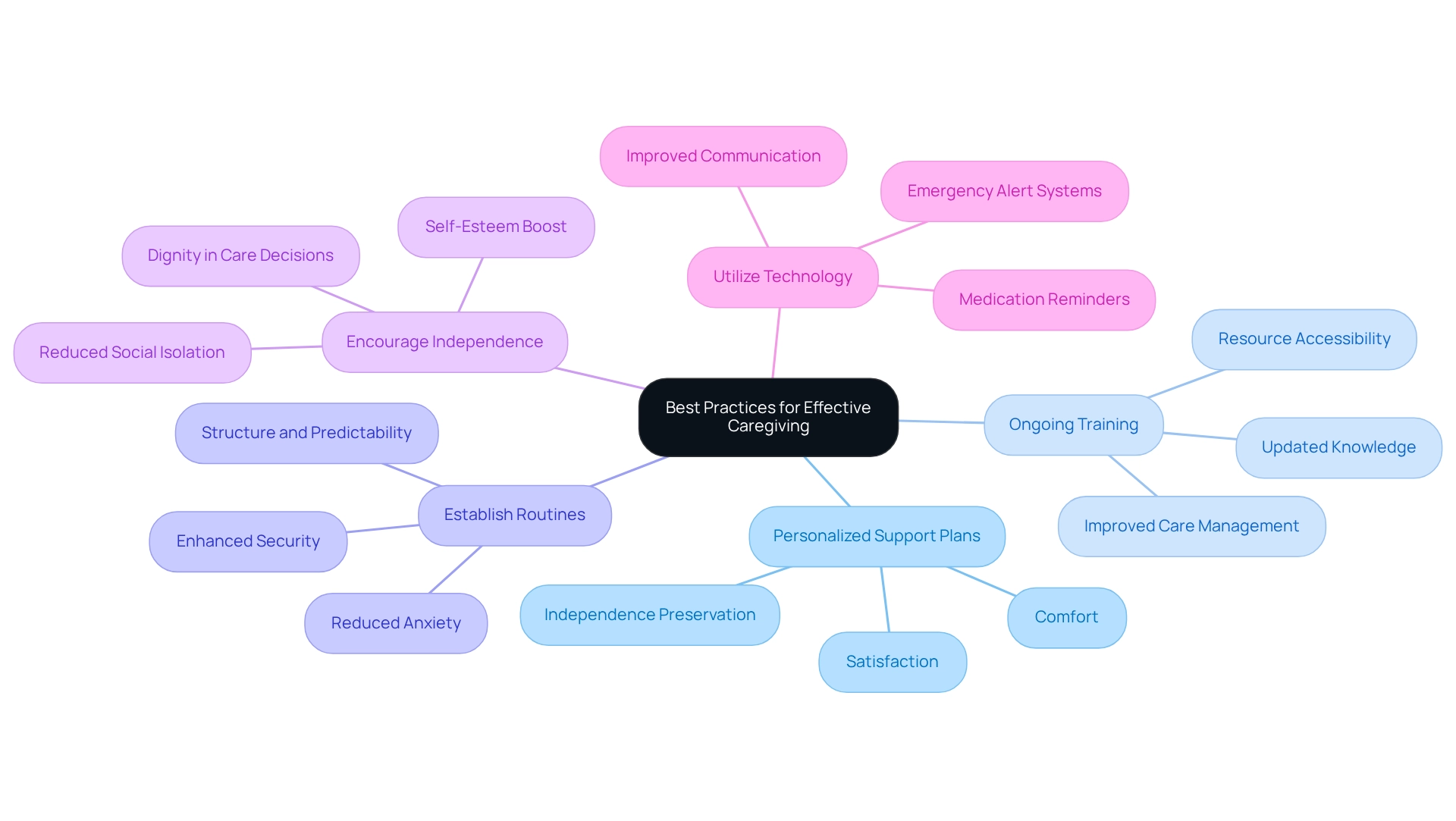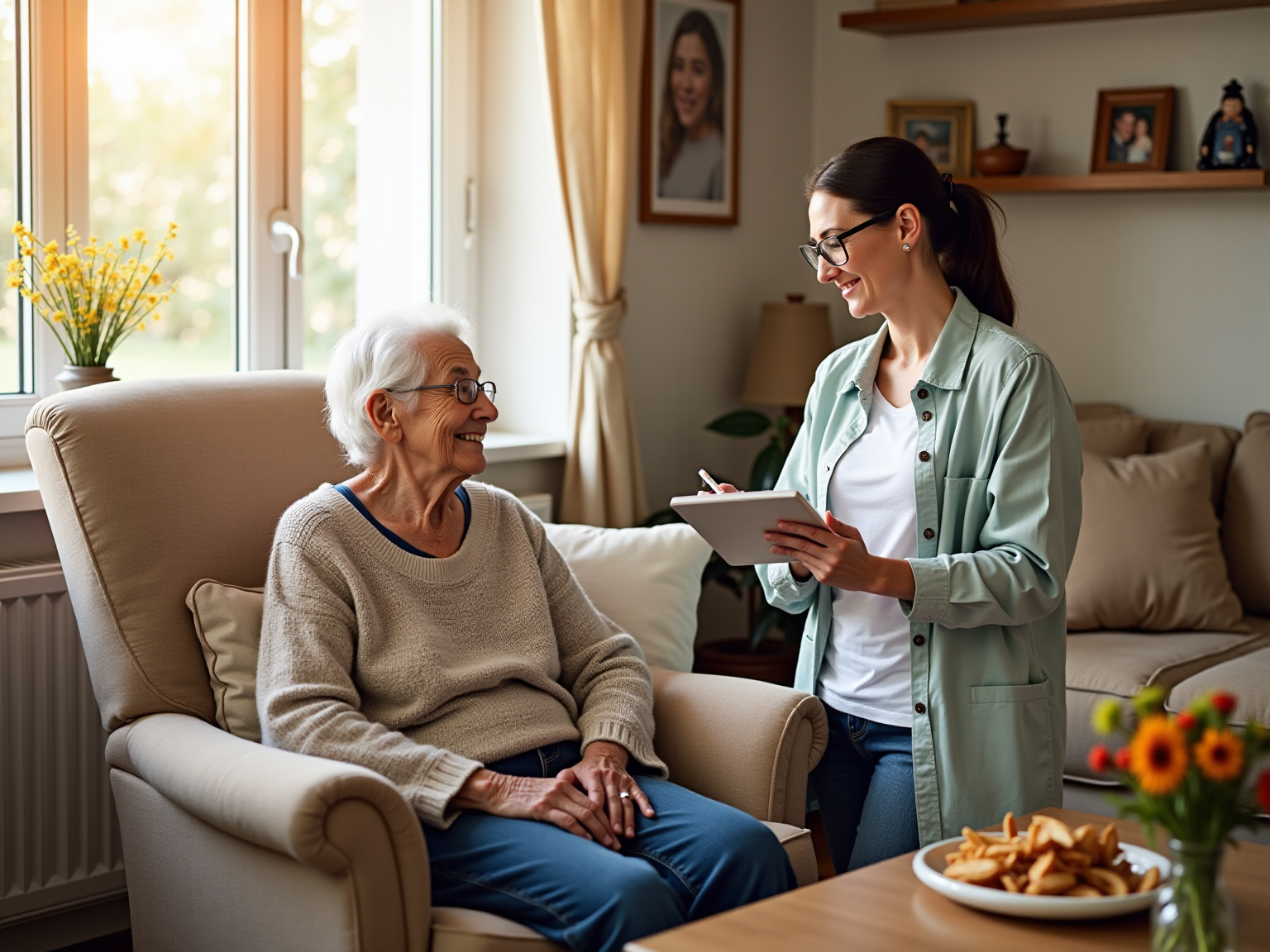Overview
In-home caregivers for the elderly offer essential support that truly makes a difference. Through personalized assistance with daily activities, companionship, and medication management, these caregivers significantly enhance the quality of life for seniors. We understand the concerns you may have about your loved ones, and it’s important to know that tailored care plans and effective communication strategies are at the heart of our approach. These practices not only foster independence but also uphold the dignity and emotional well-being of elderly individuals.
Imagine the peace of mind that comes from knowing your loved one is receiving compassionate care tailored to their unique needs. In addition, our caregivers are dedicated to building meaningful connections, ensuring that your family member feels valued and understood. As a result, we create an environment where seniors can thrive, surrounded by support that encourages their independence and happiness.
We invite you to explore how our services can provide the care your loved one deserves. Your comfort is our priority, and we are here for you every step of the way. Together, we can ensure that your family member enjoys a fulfilling and dignified life at home.
Introduction
In-home caregivers play a pivotal role in enhancing the lives of elderly individuals. They offer not just physical assistance but also emotional support that fosters a sense of connection and dignity. As the demand for these vital services continues to grow, it becomes essential to understand the comprehensive responsibilities of caregivers.
From personal care and meal preparation to medication management and companionship, the impact of in-home care is profound. This support allows seniors to thrive in their familiar surroundings, surrounded by the comforts of home. Moreover, as life expectancy increases, the need for tailored care that promotes independence and well-being has never been more critical.
This article delves into the multifaceted role of in-home caregivers, best practices for effective caregiving, and strategies for managing caregiver stress. Ultimately, it highlights the importance of personalized support in ensuring a better quality of life for the elderly. Remember, your comfort is our priority, and we’re here for you in this journey.
Understand the Role of In-Home Caregivers
In-home caregivers for elderly individuals play a crucial role in supporting them by providing assistance with daily activities and companionship that significantly enhances their quality of life. At Best Care Nurses Registry, we offer a variety of adaptable and caring home health care services tailored to meet the specific needs of each elderly individual. Our caregivers are dedicated to a wide range of responsibilities, including:
- Personal Care: Assisting with bathing, dressing, grooming, and toileting to ensure dignity and hygiene.
- Meal Preparation: Planning and preparing nutritious meals that cater to specific dietary needs, promoting health and well-being.
- Medication Management: Ensuring medications are taken as prescribed, managing refills, and providing reminders to enhance adherence to treatment plans.
- Household Tasks: Helping with light housekeeping, laundry, and shopping, allowing elderly individuals to live in a clean and organized environment.
- Companionship: Offering emotional support and engaging in social activities to combat loneliness, which is crucial as studies show that social isolation can lead to serious health issues. Our in-home caregivers not only provide physical assistance but also emotional support, ensuring that elderly individuals feel valued and connected.
- Transportation: Assisting older adults in getting to appointments or running errands safely, thereby maintaining their independence.
The importance of in-home caregivers for elderly individuals is underscored by statistics indicating that one in four adults over the age of 65 experiences a fall each year, highlighting the need for assistance to mitigate such risks. Furthermore, the in-home assistance sector has undergone a significant transformation, with a growth expectation of 4.2% annually, reflecting the increasing demand for these essential services. By offering customized assistance, in-home caregivers not only help reduce the chances of falls but also promote a sense of safety and autonomy in their own homes. This comprehensive support enables elderly individuals to thrive in a familiar environment, enhancing their overall well-being and quality of life. As life expectancy continues to rise, with women averaging 81.2 years and men 76.4 years, the role of in-home caregivers becomes increasingly vital in ensuring that seniors receive the support they need to maintain their independence and quality of life.
At Best Care Nurses Registry, we understand the significance of personalized assistance. If you or a loved one could benefit from our services, please call us at (888) 203-2529 to discuss your needs and schedule a consultation. Your cherished individuals deserve the finest support available, and we are here to assist.
Implement Best Practices for Effective Caregiving
To ensure effective support for individuals, consider the following best practices:
- Personalized Support Plans: Tailor support plans to meet the unique needs and preferences of each elderly individual, enhancing their comfort and satisfaction. Research shows that individualized support strategies can result in better outcomes for elderly individuals, making them an essential element of efficient assistance. CNA/HHA services offer individualized support that assists seniors in preserving their independence and dignity while experiencing an enhanced quality of life. Indicators pointing to the necessity for these services encompass challenges with personal hygiene, dressing, cooking, cleaning, or handling medications.
- Ongoing Training: Prioritize continuous education for those providing care to remain informed about the latest best practices in elder care, including safety protocols and effective communication techniques. This ongoing training can help alleviate some of the challenges faced by those providing care, as 66% report difficulty in finding adequate resources. Well-trained caregivers, including CNAs who focus on medical tasks and HHAs who assist with daily living activities, can better manage chronic conditions and provide essential medical monitoring, which is vital for the health of older adults.
- Establish Routines: Implement consistent daily routines that offer structure and predictability, which can be particularly comforting for older individuals. Consistent habits can assist in reducing feelings of anxiety and enhance a sense of security.
- Encourage Independence: Foster self-esteem and dignity by involving older adults in their own care decisions, cultivating a sense of autonomy. This approach not only enhances their quality of life but also reduces the risk of social isolation, a common issue faced by older adults without adequate support.
- Utilize Technology: Leverage assistive technologies, such as medication reminders and emergency alert systems, to improve safety and facilitate communication. These tools can greatly improve the caregiving experience and guarantee that elderly individuals receive prompt help when necessary.
By following these practices, those who provide care can foster a nurturing atmosphere that greatly boosts the well-being and contentment of their clients. The economic worth of unpaid assistance given by family providers is estimated at $600 billion each year, emphasizing the significance of supporting both paid and unpaid helpers. As illustrated by Best Care Nurses Registry, in-home caregivers for the elderly can provide personalized support that greatly improves the quality of life for seniors, allowing them to age gracefully in familiar surroundings. Acknowledging the invaluable contributions of those who provide care and addressing their needs is essential for shaping a supportive social and policy environment.

Manage Caregiver Stress and Emotional Well-Being
Caregiver stress is a common challenge that can deeply impact the quality of care provided. To effectively manage this stress, consider these nurturing strategies:
- Set Boundaries: Clearly define the line between caregiving duties and personal time. This practice is essential for maintaining your mental health and ensuring that you do not neglect your own needs.
- Seek Assistance: Participating in support groups or counseling can offer a vital outlet for sharing experiences and receiving emotional support. Research shows that individuals involved in these groups report enhanced emotional health and reduced feelings of loneliness. Tools like CaringBridge can also help you stay connected with family and friends, enhancing communication and support.
- Practice Self-Care: Prioritize activities that promote self-care, such as regular exercise, pursuing hobbies, and using relaxation techniques. As AARP’s Yeh observes, ‘Those who possess a sense of purpose tend to look after themselves — and even live longer.’ These activities are crucial for recharging and maintaining your overall health.
- Take Breaks: Schedule consistent breaks to rest and rejuvenate. These breaks allow you to return to your duties with renewed focus and energy, ultimately benefiting those you assist.
- Communicate Openly: Foster open communication with family members and healthcare providers to express your concerns and seek assistance when needed. This transparency can alleviate stress and help create a supportive network.
By applying these strategies, you can greatly enhance your resilience as a caregiver, allowing you to provide empathetic assistance while protecting your emotional well-being. Recent studies highlight that half of employers acknowledge that workers’ caregiving responsibilities negatively affect their health and productivity. Many caregivers resort to unhealthy coping mechanisms, such as alcohol and medication, to manage stress. By promoting healthier strategies and support resources, including insights from the case study ‘Coping Mechanisms of Caregivers,’ you can better navigate the challenges you face. Remember, you are not alone in this journey; we’re here for you.
Foster Communication with Families and Healthcare Providers
Effective communication is essential for successful caregiving provided by in-home caregivers for the elderly. Here are several strategies to enhance this vital aspect:
- Regular Updates: Keeping families informed with consistent updates about the elderly person’s condition and any changes in care needs fosters transparency and trust. Did you know that studies show patients who receive personalized communications are 60% more likely to engage with recommended clinical programs? This highlights the importance of timely information. Regular updates from in-home caregivers for the elderly ensure families feel connected and informed.
- Active Listening: Engaging in active listening allows caregivers to fully understand the worries and preferences of both the elderly person and their family members, ensuring that assistance aligns with their needs. At Best Care Nurses Registry, in-home caregivers for the elderly are trained to prioritize these interactions, thereby enhancing the overall support experience.
- Collaborative Care Meetings: Arranging regular gatherings with families and healthcare professionals encourages open dialogues about treatment strategies and addresses any arising concerns. This fosters a team-oriented approach to support. Such collaboration guarantees that support solutions, including in-home caregivers for the elderly, are tailored and attentive to the changing requirements of seniors.
- Use of Technology: Utilizing communication tools like shared health apps or messaging platforms can keep everyone informed and engaged, facilitating coordination and sharing of updates. Best Care Nurses Registry promotes these technologies to enhance communication and simplify service processes for in-home caregivers for the elderly.
- Promoting Family Participation: Actively engaging family members in the caregiving process not only empowers them but also strengthens their bond to the support offered. Encouraging involvement in care choices and activities can greatly enhance family satisfaction and assistance, particularly when in-home caregivers for the elderly are involved, reducing stress for family members who provide care.
- Community Support: Sharing experiences and insights with fellow caregivers fosters connection and support within the caregiving network, which can be invaluable for emotional resilience. Best Care Nurses Registry recognizes the significance of community and provides resources to connect in-home caregivers for the elderly with one another.
As Ira Brooker states, “Our in-house experts will develop a solution tailored to your practice’s specific needs while demonstrating personalized solutions to keep your communications timely, relevant, and accurate.” By prioritizing these communication strategies, support providers can build trust and ensure a unified approach to assistance from in-home caregivers for elderly individuals. This ultimately enhances the quality of life for these individuals and their families. Additionally, insights from the case study titled “How to Create a Safe Home Environment for Alzheimer’s Patients” indicate that thoughtful environmental modifications, combined with effective communication, can significantly improve the quality of life for individuals with Alzheimer’s.
For personalized support and to learn more about the services offered by Best Care Nurses Registry, including caregiver referrals and customized care plans, call (888) 203-2529 to schedule a consultation today.
Conclusion
In-home caregivers play a vital role in enhancing the lives of elderly individuals, offering a unique blend of physical assistance and emotional support that nurtures independence and dignity. Their diverse responsibilities—ranging from personal care and meal preparation to medication management and companionship—significantly contribute to the overall well-being of seniors. As the demand for these essential services continues to grow, it becomes increasingly important to understand the comprehensive role of caregivers.
Implementing best practices in caregiving, such as personalized care plans, ongoing training, and encouraging independence, can greatly enhance the quality of care provided. These strategies not only improve the lives of those receiving care but also foster a healthier and more sustainable caregiving environment. Recognizing the economic and emotional impact of caregiving highlights the necessity of supporting both paid and unpaid caregivers in their crucial roles.
Furthermore, managing caregiver stress and fostering open communication with families and healthcare providers are pivotal in ensuring a positive caregiving experience. By prioritizing self-care and creating supportive networks, caregivers can maintain their well-being while providing compassionate care to their loved ones.
In summary, the multifaceted role of in-home caregivers is indispensable in promoting a better quality of life for elderly individuals. By investing in personalized care and supporting caregivers’ needs, we can ensure that seniors thrive in the comfort of their homes, surrounded by the love and support they deserve. Remember, we’re here for you—your comfort is our priority.
Frequently Asked Questions
What is the role of in-home caregivers for elderly individuals?
In-home caregivers provide essential support to elderly individuals by assisting with daily activities and offering companionship, which significantly enhances their quality of life.
What services does Best Care Nurses Registry offer for elderly care?
Best Care Nurses Registry offers a variety of adaptable home health care services, including personal care, meal preparation, medication management, household tasks, companionship, and transportation.
How do in-home caregivers assist with personal care?
In-home caregivers assist with bathing, dressing, grooming, and toileting to ensure dignity and hygiene for elderly individuals.
What is included in meal preparation services?
Meal preparation services include planning and preparing nutritious meals that cater to specific dietary needs, promoting health and well-being.
How do in-home caregivers manage medication for elderly individuals?
In-home caregivers ensure that medications are taken as prescribed, manage refills, and provide reminders to enhance adherence to treatment plans.
What household tasks can in-home caregivers help with?
In-home caregivers can assist with light housekeeping, laundry, and shopping, allowing elderly individuals to live in a clean and organized environment.
Why is companionship important for elderly individuals?
Companionship is crucial as it offers emotional support and engages elderly individuals in social activities, helping to combat loneliness, which can lead to serious health issues.
How do in-home caregivers assist with transportation?
In-home caregivers help older adults get to appointments or run errands safely, thereby maintaining their independence.
What statistics highlight the need for in-home caregivers?
Statistics indicate that one in four adults over the age of 65 experiences a fall each year, underscoring the need for assistance to mitigate such risks.
What is the growth expectation for the in-home assistance sector?
The in-home assistance sector is expected to grow by 4.2% annually, reflecting the increasing demand for these essential services.
How do in-home caregivers enhance the well-being of elderly individuals?
In-home caregivers provide customized assistance that helps reduce the chances of falls and promotes a sense of safety and autonomy, enabling elderly individuals to thrive in a familiar environment.
How can someone benefit from the services of Best Care Nurses Registry?
Individuals interested in in-home care services can call Best Care Nurses Registry at (888) 203-2529 to discuss their needs and schedule a consultation.











